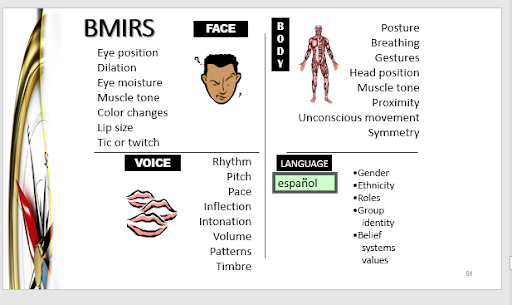Committed Listening
“Committed listening transforms relationships and deepens learning. Its skillful use requires practice and discipline.” — Dennis Sparks
“The most fundamental coaching skill is listening. Listening is not the passive process it seems because it involves dedicated attention to the other person an exquisite attention to the language they are using.” — Jenny Rogers
“We listen first to understand, not to respond.” — Steven Covey
UNPRODUCTIVE PATTERNS OF LISTENING
- Judgement/Criticism
- Autobiographical
- Inquisitive
Turning down the volume of the commentary in one’s head; full presence, no multitasking, no distractions. Committed Listening!
LISTEN FOR…
- What the person wants
- Emotion
- Passion
- Possibility and/or Potential
- What’s already working
Reframe the:
- Negative to the positive
- Problem to a solution
- Complaint to a commitment

- What might others read in my BMIRS?
- What do I pay attention to w/ my BMIRS?
- What BMIRS do I pay attention to in others?
- What influences our BMIRS?
- How does your gender influence your listening?
- From neuroscience the scientific support for the significance of listening. Through technology, scientists can see the working of the brain in real time, and see that the prefrontal cortex fires in a different way with a committed listening than when the conversation occurs with the self.
- Steven Covey: “Listening is the psychological equivalent of air.”
WE LISTEN TO…
- Gain clarity about an issue
- Gather data for feedback
- Seeks patterns of behavior
- Understand the needs and perceptions of the another
- Allow the client to refine thinking and perception by speaking to an attentive speaker
- Lay a path for building response and solutions


